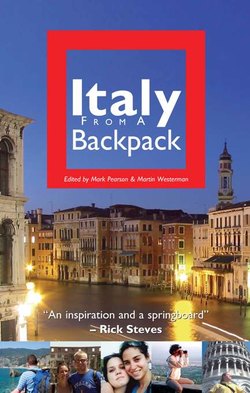Читать книгу Italy from a Backpack - Mark Pearson - Страница 12
На сайте Литреса книга снята с продажи.
ОглавлениеRome
Becoming History
shannalee t’koy
on a warm March afternoon, when my American friends and family were just sitting down to breakfast, when people in Moscow were just eating dinner, and people in Beijing were sound asleep, I saw it. The dense crowd of tourists around it, pushing and elbowing, filling the air with their clamorous cacophony of voices, remained contentedly oblivious. Using it to frame and snap friend-filled photographs, glancing upon it for fractions of seconds before resuming conversations and dancing onward, they seemed barely aware.
But I, who had been occupied with sifting through silk ties and inventorying my souvenir purchases, looked up and suddenly stood awestruck, in the presence of a monumental creation worlds larger than myself.
I was standing in a little shop. Moments before, I had been walking in Rome, where I had been inhaling history and absorbing sights into my mental scrapbook, joining photographs together in my mind. I knew that millions of people had come to this location before me, and millions would come after. But for me, that day, at that moment, I stood in the presence of magnificence, and my feet rooted me to the cobblestones. It was like a dream, and I kept telling myself, I’m in Italy, as if the dramatic surroundings couldn’t fully convince me. I hoped that in that moment, I could make it mine, possess it, so that it would belong to me from then on.
It was Trevi Fountain. The cloudless indigo backdrop of the sky threw its every detail into radiant, sun-kissed relief. Most awesome was its size: everything about its massive pillars and sculpture dwarfed the people at its base. I had seen this work of art miniaturized in postcards and on television screens, but I could see now that they did the real thing an injustice. This Trevi Fountain took my breath away. I was forced to step back to behold its entirety.
The central statue, of the legendary Roman sea-god Neptune, seemed supernatural above the horses half-immersed in frothing water beneath him. Omniscient and powerful, the mythological god rose highest in the fountain, riding his shell-like chariot with his gaze fixed on the square around him, as if he controlled its movements. Surrounded by tall orange and yellow buildings, his majesty’s appearance was fantastic in the bustling square, and he invited us to believe there was magic in the fountain’s splashing turquoise pool.
A steady stream of people flowed around the fountain’s edges. Tourists followed Roman legend by tossing wish-filled coins into the water. If the thousands of coins covering the fountain’s floor were any indication, countless travelers had trusted this frozen Neptune to alter their destinies for good, and guarantee them a return to Rome. I found myself imagining centuries of these wishers, clad in different apparel, carrying different burdens than mine or my fellow travelers’, but admiring this marvelous sight just like us. Through all this, the fountain stood. In that moment, I sensed that Trevi wasn’t becoming part of my history; I was becoming part of its.
I found myself imagining centuries of these wishers.
A child I know recently mentioned how far away we Chicago natives lived from New York. His innocence made me laugh, but I suppose, at his age, I viewed places like New York as infinitely distant, too. I thought Third World countries and war and violence couldn’t be important if they were that far away. I thought of England and China as being other planets entirely, and when my dad traveled overseas, I couldn’t comprehend his inhabiting a place so far away the same way he would inhabit our house on our street in America.
That was a time when I thought that my world was the only world; when I thought that the way people in my world acted was the way everyone else in the world acted. Now, my travels have landed me in a sea of human beings who speak languages foreign to me, who live differently from me in a million ways, and whose lives are completely unconnected to mine. I no longer feel so important or big. But maybe by connecting myself to timeless places like Rome, and joining the invisible register of visitors who have stood where I stand, I enlarge myself. Maybe by being part of a massive whole, I’m not so insignificant after all, and as my perspective grows, so does my world.
As I watched the crowd in front of the Trevi, a group of tourists gathered by a tall lamppost to take photographs. A few young Roman men perched atop a raised stone step, laughing about the passing characters. Two suited businessmen wandered through the crowd, immune to the surrounding noise.
People spread through the three intersecting roads that lead to the fountain. Some peered through camera lenses, moving continually backward as they tried to capture the sculpture in one frame. Some moved beyond the landmark to nearby streets, in search of gelato, watercolor paintings or souvenirs. All this, under the same perfect, deep-blue sky I have seen at home, the one that graces every country and city on Earth.
Long after we’re gone, the fountain will remain, and future visitors will come, remark on its grandeur and snap photographs. And many more will throw coins loaded with wishes into its waters, to barter with destiny under Neptune’s steady gaze.
SHANNALEE T’KOY is a twenty-something graduate student living in the Chicago area. She enjoys expanding her horizons through school, travel and reading.
